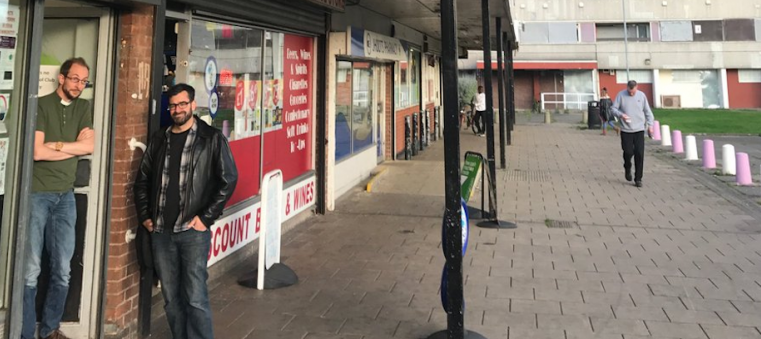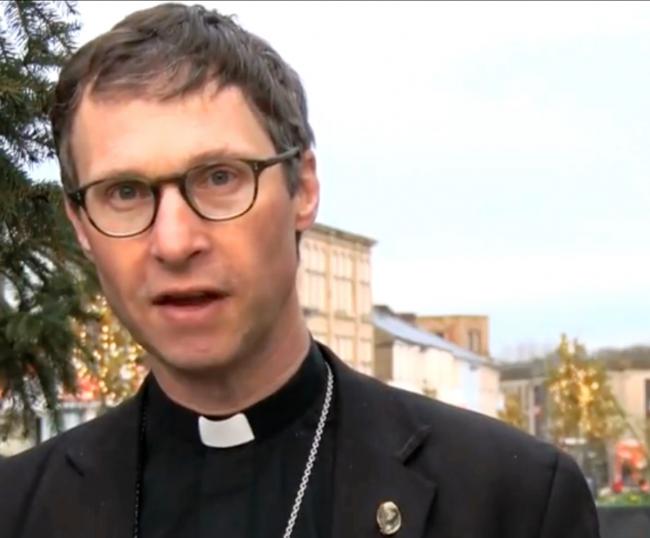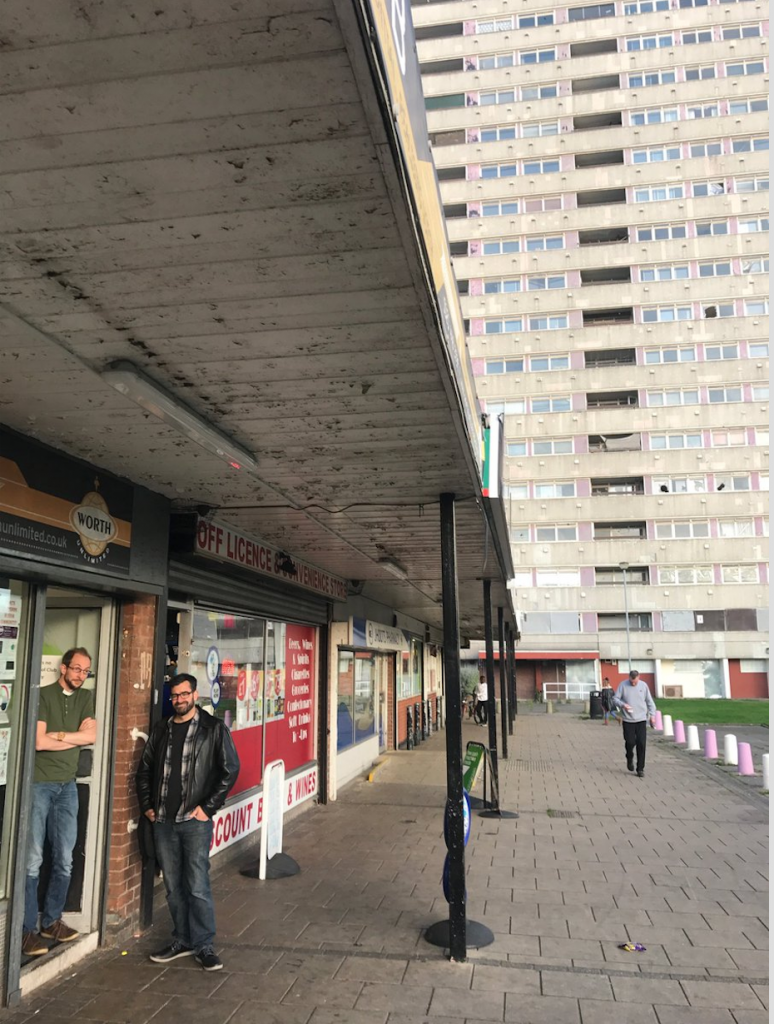
Church of the Poor
In this era of declining congregations and falling numbers of clergy, challenging questions are being asked. What is the best way to grow the Church? What is the nature of the relationship between churches and communities, especially in the marginalised forgotten towns and outer estates? Are churches being true to the Gospel? Are they serving people right across our national community?
A church that abandons the poor might well be financially viable. It’s just that it would no longer be the Church of Jesus Christ. If we abandon the poor, we abandon God. If we fail to proclaim the good news to the poor, we lose the right and the authority to proclaim the good news to anyone, anywhere.
The Bishop of Burnley evokes powerfully the challenges facing the Church of England – and some other Christian denominations – in their engagement with people today. His contention is that churches have shrunk back from the communities that were at the heart of Jesus’ ministry on Earth: the poor, the destitute, those rejected by the mainstream and marginalised.
In an attempt to turn around the downward trajectory and drive up congregation numbers, a hard nosed strategy has been adopted by the Church of England, driven by multiple factors, not least financial constraints, changing social norms and demographics. While some have focused on fostering new, often young, popular faith communities in university towns and cosmopolitan city centres, the charge is that this leads to a departure from core mission, with questions around the consequences of this approach for the very purpose of the Church.
If church growth strategy fails to engage with people on the margins, particularly in outer estates and forgotten towns, is it risking the impoverishment of the whole body? Is it not the poor and rejected who are at the heart of the Gospel, and often able to provide wisdom that the ‘successful’ and the ‘strong’ are unable to access? What is success and strength in the eyes of God? Are we seeing the inadvertent abandonment of the very foundations of the Gospel in which the poor are central?

Rt Revd Philip North, Bishop of Burnley
What kind of church is it that turns its back on the dispossessed, or offers them only crumbs from the table of the rich?
Philip North and others have highlighted how the Church has failed to grasp the situation, as time, money, resources and clergy have been focused on more affluent towns and cities judged more likely to yield faster growth. The Church of England spends just £5 per head of population on deprived estates, almost 40% less than the average across the country. What results from this is a Church that actively disengages with the poor.
Poorer communities often lack the situational factors needed to support robust and innovative church ministry and so frequently struggle to attract a strong cohort of applicants. It is not unusual to count the applications for an outer estate vicar role in single figures, whilst dynamic inner city positions can attract over 100 applicants. Communities lacking financial resources and well-resourced schools struggle to attract clergy families, whilst affluent areas are popular choices. The consequences are obvious. The Church becomes a place for highly educated clergy to preach back at pretty much the same middle class community they came from.
The irony deepens further when leading church figures rail against poverty and advocate ‘giving a voice to the voiceless’, whilst at the same time they are becoming progressively dislocated from people who are poor.
North is quite explicit about this:
We are hooked on an outdated Temple model: thinking we are doing good by shouting at government from on high rather than seeking locally-based solutions. I am sick and tired of hearing pompous tosh about the ‘Church’s prophetic voice’ or the ‘Church in the public square’ whilst at the same time we are busy abandoning the people we purport to represent.
A church that speaks to the whole nation has the potential to do so more effectively than any government, party or special interest group. But one that is genuinely embedded only in certain sections of the population loses its ability to feel the pulse of the whole national community. Its voice will be characterised only by the groups it knows well – and may alienate those from whom it is estranged.
There is no doubt that most Christians want to see the lives of the dispossessed and marginalised transformed. But how is that achieved? This is the challenge that Common Good thinking raises: is change most effectively achieved through advocacy, or through relationship? The Church’s ability to play its part in solving social and economy poverty, injustice and human need looks unconvincing when it loses touch with the very communities who are living these everyday realities.
The Church should not shrink from finding ways to serve and proclaim God’s Word more boldly with people who may otherwise never hear His truth, however challenging it may be. Engaging in the hardest areas will grow the Church in spirit and body.
Those who work in this way already invariably testify that the gifts are reciprocal – given the right support, they find it personally, spiritually and professionally transformational. The Eden Network for example, has over fifty groups of ‘urban missionaries’ living in left behind areas. This kind of ministry isn’t an easy ride, but it will reward, which is why it must be properly resourced, something well known to those involved in the National Estate Churches Network. There are many other iterations and styles, including some of the non denominational evangelical church networks, such as Jubilee Plus which supports many churches running successful volunteer-led community engagement programmes.
We are all called to grasp this challenge with both hands, not least because it is also a gift. Yet at the moment there are those who, as Bishop North rightly exposes, simply ‘proclaim and ignore the hard reality of people’s lives’. If the Church is out of touch with some of the most marginalised in our national community, this gift will be lost, and we will become ‘hypocrites and the Gospel we speak is empty’.

Dedication to empowering local leadership is key: supporting and enabling local people to be the leaders of their church must be at the heart of any strategy. Local leaders will not only ensure a more authentic expression of discipleship, rooted in place, but also provide a more sustainable, long-term footing and ensure better engagement in the community. It is advisable to be on the alert for the inevitable tendency for middle class takeover. When people are invested in generating church culture themselves, it is naturally more authentic.
The Church of England has recognised and begun this work – as part of the Renewal and Reform programme for example, more than £1.5 million has been given to the Diocese of Blackburn for work in outer urban estates and parishes, including the recruitment of lay leaders. But this is just the start. There is a long way to go.
Let’s invite everyone to the feast of the lamb. And let’s start with those who most need good news of hope. For when we speak hope to the poor, we speak hope to everyone.
More broadly, supporting local ministry and developing the leaders of tomorrow will make the Church more representative of the people it serves. Dispatching middle class, university-educated young men and women to an estate sometimes is very successful, but often it can put clergy in a position facing a community they struggle to relate to or understand.
However, appropriate recruitment is not straightforward. Bishop North rightly notes that candidates from less affluent backgrounds are far less likely to have had the life chances that enable them to evidence leadership skills, or to have experienced moving away for university or work. A proactive approach to developing these leaders is vital, helping them to build leadership skills, while valuing and honouring the cultural gifts and unique experiences they bring. It seems a truism but sadly it must be restated again and again: the Church must be for all, not just the affluent and university educated.
It must also be a Church of all. By supporting local people into ministry roles and positions of authority, the seeds of tomorrow’s clergy and tomorrow’s leaders will be sown, inspiring people from across social and cultural divides – renewing the Church into a body that is authentic and genuinely broad-based.
An inspirational young priest who grew up in the community he now preaches in, who lives the same way as those who come to him in need, can offer not only shared experience but a role model to those who may have none at all. Putting the needs of local communities first and devoting the time, energy and trust to develop leaders among them will open the Word of God to all. Only then can the Church become genuinely transformational.
The future of churches is in their past
This blog has focused on the Church of England, but the issues set out here apply to some degree across all denominations. Regrettably, the tendency of ‘middle class competence’ taking over in churches mirrors secular cultural change. Some parts of the Church have been drawn into a more cosmopolitan way of thinking which may be popular among the educated young, but this can blind them to the different interests and values of many communities who are rooted in place and tradition.
Indeed, as David Goodhart observes in ‘The Road to Somewhere‘, the most significant fault line underpinning the causes of Brexit is the chasm between the university educated and those who have not had a higher education. Similarly T4CG’s Jenny Sinclair, in ‘Rebuilding the Broken Body’ calls people across the churches to make an examination of conscience and recognise that some have, perhaps inadvertently, become estranged from traditional or left-behind communities, and even from struggling families in their own neighbourhood.
If churches have taken their eye off the ball, they can always return to look at ways to re-engage, and prioritise relationships with people who are marginalised. It may be easier to retreat into the familiar territory of middle class neighbourhoods and cosmopolitan city centres, but if the poor are not at the heart of the Church, what has it become? The Church is called to be counter-cultural, to be in relationship with those the dominant culture despises and rejects.
Renewal comes not only from the low hanging fruit, but from courageous mission in the places where it’s toughest. At times it can seem that expanding the Church after decades of decline is impossible. But the history of Christianity shows that only through constant renewal does it survive and thrive. And every time it does that, it engages first and foremost with the poor. Jesus shows us the way.
Entering community
The values of the Common Good fit closely with the mission to turn this strategic error around. North speaks of successful evangelism beginning with ‘intense listening, with a profound desire to hear the issues on people’s minds and a genuine open heart to discern how Jesus speaks into them.’
Al Barrett, Rector of Hodge Hill in the West Midlands, goes further in his blog:
Rather than ‘potential Christians’ …or ’empty vessels’ waiting to be filled, what if we were to see our neighbours as abundantly gifted (gifted by God, of course): with wonderful, surprising, awkward, unsettling, transformative gifts, waiting for us to receive them, be challenged by them, be changed by them? Those gifts might include hospitality and kindness, stories and wisdom, challenges and questions, prayerfulness and playfulness – among many others. How richly blessed would we find ourselves to be, when we began to receive the gifts of our neighbours (and often from those neighbours who, seen through a financial lens, have little that can be counted)?
This is the Common Good in practice, where the emphasis is on working with, learning from, and listening to the interests of local communities, rather than taking over or imposing an (often middle class and liberal) agenda. The principle of subsidiarity is key: clergy and church members play a vital but supporting role, enabling local leadership. In this way the Church becomes a vehicle for flourishing human relationships by sharing the joy of Christ, inspiring and supporting local people to create solutions to local problems.
This is what the Church needs to be, but when its strategy effectively gives up on these localities and traditional cultures, it withdraws from its true purpose and its calling to support the flourishing of all peoples. By failing to keep the poor at the heart of its relationships, the Church risks impoverishing itself, putting its very mission in jeopardy. Vibrant city centre student ministries are, of course, a wonderful thing, but represent only one part of the body of Christ. By proclaiming God’s Word and serving with generosity and compassion the people who are most vulnerable and rejected, churches will reinvigorate not just communities of the left-behind, but also the mission of the Church and its calling on Earth.
We are so busy looking back to the church’s past that we fail to see ahead to God’s future…The lesson of scripture, the lesson of the past is clear. If we want renewal, we must start with the poor.
Tom Ketteringham
To read Bishop North’s full speech, Hope for the Poor, given at the New Wine Conference, click here.
Al Barrett’s blog, The Estate We’re In, is here.
Jenny Sinclair’s Good Neighbours and the Common Good, is here.
